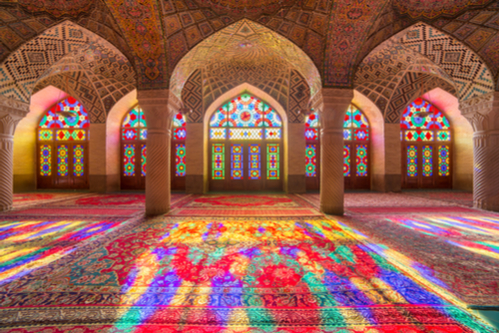Education Curriculum
-
-
View Topics
Independent Topics
- 9.1 Muslim Converts – Welcome to Islam!
Being a Muslim gets you noticed. As a new Muslim, you’re a representative of the religion. Being a convert to Islam also brings about new challenges, like loneliness, despair and dealing with Muslims who give Islam a bad name.
- 9.2 Basic Dos and Don’ts of Being a Muslim
Converting to Islam isn’t just a change in belief, it is a change in one’s life. By practicing Islam, you and those around you will see many changes in your lifestyle. From the time you wake up to how you clean yourself, Islam changes everything.
- 9.3 Halal Food and Zabiha
Halal food and zabiha meat is one of the big topics in the West. Here we look at what Zabiha is and what we can do when there is no halal meat around.
- 9.4 Modesty in Islam
Modesty is central to the religion of Islam. Both men and women need to be modest in dress and in behavior and avoid encouraging sexual attraction from people other than their spouses.
- 9.5 Family, Parents and Marriage in Islam
Parents play central role in the religiosity and moral upbringing of their children. It is not enough to just teach them words, parents need to be active role models for the future generation.
- 9.6 Marriage in Islam
Healthy communities come from healthy families, and healthy families come from healthy marriages. Islam gives the blueprint to healthy marriages by setting rules, duties and responsibilities.
- 9.7 Islam and Sex
The two major sexual sins are zina and liwat. Zina is extramarital or premarital sex whereas liwat, a category of its own, refers to homosexual acts. Both are forbidden as they ruin people’s souls.
- 9.8 Women’s Menstruation in Islam
Menstruation in Islam is a legal and not necessarily biological category. It comes with its dos and don’ts just like men’s ritual impurity.
- 9.9 Music, Alcohol, Drugs and Pork in Islam
Islam is the strictest of all religions when it comes to the vices of alcohol, drugs, music and pork. Islam views them as spiritually polluting and to be abstained from.
- 9.10 Islam and Science
Is Islam and science compatible? This lesson makes a positive case for the compatibility of Islam, science and the scientific method.
- 9.11 A Reading List of Islamic Knowledge
The most daunting of tasks is finding out where to start in learning about one’s own religion. Here we list some of the important books that Muslims in the West should read.
- 9.12 Islam and Sufism
Sufism is at the heart of Islam. It began with the Prophet Muhammad (s) and its authentic real teachings continued with his Ahl al-Bayt (as). Sufism is known through its practice of unceasing remembrance of God and spiritual self-awareness. However, not all forms of Sufism are acceptable by Islamic standards.
- 9.13 Ritual Prayers and Supplications in Islam
Salat are ritual prayers in Islam. Unlike some other religions, Islam makes a theoretical distinction between supplications (duʿas) and ritual prayers (salat). Here we discuss the difference between the two, and list a few important salats and duʿas.
- 9.14 Death & Burial Rituals in Islam
The process and significance of death rituals in Islam. In Islam, death rituals are a step by step process.
- 9.15 The Battle of Armageddon: An Islamic View
The major events of the end of times according to Islam and the details of the battle of Armageddon. Here the roles of the Anti-Christ, Jesus and Imam al-Mahdi will be covered.
- 9.16 The Muslim Calendar
The Muslim calendar is different from the Western calendar, here we look into the details of the calendar and see what makes it unique.
- 9.17 Muslims and non-Muslims in the Shariah
Muslims must respect the laws of non-Muslim countries when they are living in them. Muslims are also not allowed to force people to convert to Islam.
- 9.18 A Timeline of Major Events in Islamic History
A timeline of major events in Islamic history through the eyes of the Western calendar. From the birth of the Prophet Muhammad (s) to the end of the Ottoman empire.
- 9.19 Introducing the Qur’an: Why it is the way it is
The Qur’an is the revealed book of Allah. It is the foundational book of Islam and contains all the necessary principles to lead an Islamic life. The Qur’an is a unique book that needs to be understood on its own grounds.
- 9.20 The School of Imam Jafar al-Sadiq
Imam Jafar al-Sadiq founded the school of the Ahl al-Bayt (as). Before him, the teachings of the Ahl al-Bait (as) was more of an oral tradition, but with his coming, a systematic doctrine of pure Muhammadan Islam was born.
- 9.21 Major Fields in Islamic Studies
This is an review of the major fields of study in Islam, including ilm al-kalam (theology) up until akhlaq (science of spiritual ethics).
- 9.22 The Caliphate in Sunni and Shia Islam
The concept of a Caliph and Caliphate in Sunni Islam and how it differs from the Shia view on the matter.
- 9.23 The Spread of Islam: After the Prophet until the Ottoman Empire
Was Islam spread peacefully or spread by the sword? In this lesson, we see how Islam was spread peacefully and mostly by unarmed Sufis.
- 9.24 Islam, Racism and Anti-Semitism
Racism, anti-Semitism or misogyny has no place in Islam. Islam believes that all human beings are honored sons and daughters of Adam (as). The only thing that makes a person superior to another in Islam is piety and righteousness.
- 9.1 Muslim Converts – Welcome to Islam!
-
View Topics
-
-
View Topics
Islam, Religion, and Modern Controversies
- 10.1 Modern Fallacies about God: where Theists and Atheists Agree
Many theists today objectify God by understanding him as an object that exists along side other objects in the universe. By objectifying God, theists put the Abrahamic God on the same level as the gods of mythology* who, as an immortal but limited and contingent being, exists in the same was as Zeus would exist. This lecture observes how atheists have taken advantage of this objectified and erroneous conception of God and made it a grounds for denying His existence. It concludes that the god which atheists are rejecting is also rejected by the Prophet Muhammad (s) and his Ahl al-Bayt (as).
- 10.2 Tawhīd: The Muslim God according to the Prophet Muhammad and the Ahl al-Bayt (as)
God according to Islam is a being that transcends all of space, time, and matter. He does not exist like a galaxy or black hole would exist but is instead the source of all of existence and the grounds which gives the possibility of anything to exist in the first place. The evidence for the Muslim God’s existence is primarily logic and the consciousness of being, which science itself presupposes before it can do any kind of “science”. The reality of God, to the dismay of atheists, as understood by the Prophet Muhammad and his Holy Household, can be established independent of scientific truths and discoveries.
- 10.3 God’s Existence: The Argument From Being (Wujūd)
The argument from Being in demonstrating God’s existence is powerful for it does not depend on any scientific discovery or knowledge of how the universe works. It is purely based on the concept of existence which is logically prior to physical reality. Awareness of existence, especially one’s own, is the starting point in concluding that God exists.
- 10.4 God’s Existence: The Kalam Cosmological Argument
The Kalam Cosmological Argument benefits from recent discoveries in science and thus establishes a strong case for the existence of God.
- 10.5 God’s Existence: The Argument From Design
The argument from design states that if the world is designed, it must have a designer. That designer must be God as the originator of the universe.The argument from design states that if the world is designed, it must have a designer.
- 10.6 The Problem of Evil, Suffering and Pain
The problem of evil is the greatest challenge to faith in God. This lesson attempts to answer both the intellectual and emotional problems of evil.
- 10.7 Why did God Create Us? The Purpose of our Creation
Here we look at some of the reasons why God created human beings. We also look at what our purpose in this world is and why God created evil people.
- 10.8 Why Humans Need Religion according to Islam
The purpose of religion according to Islam is to purify our souls and lead our hearts to eternal salvation. The aim of religion is to cultivate īmān , that is, a deep relationship of trust with God.
- 10.9 Jahl and Spiritual Ignorance in Islam
The Arabic word jahl is ubiquitously used in the Qur’an but often mistranslated. Conceptually speaking, it means foolishness and ignorance of God.
- 10.10 Faith in Islam: Belief without Evidence?
Faith does not mean “belief without evidence.” Faith or īmān in Islam means deeply trusting God in His providence and truthfulness.
- 10.11 Do Non-Muslims Go to Hell?
Non-Muslims who are sincere and good at heart may be endowed with God’s grace and enter heaven. Non-Muslims who arrogantly reject Islam while knowing the truth may enter hell.
- 10.1 Modern Fallacies about God: where Theists and Atheists Agree
-
View Topics



